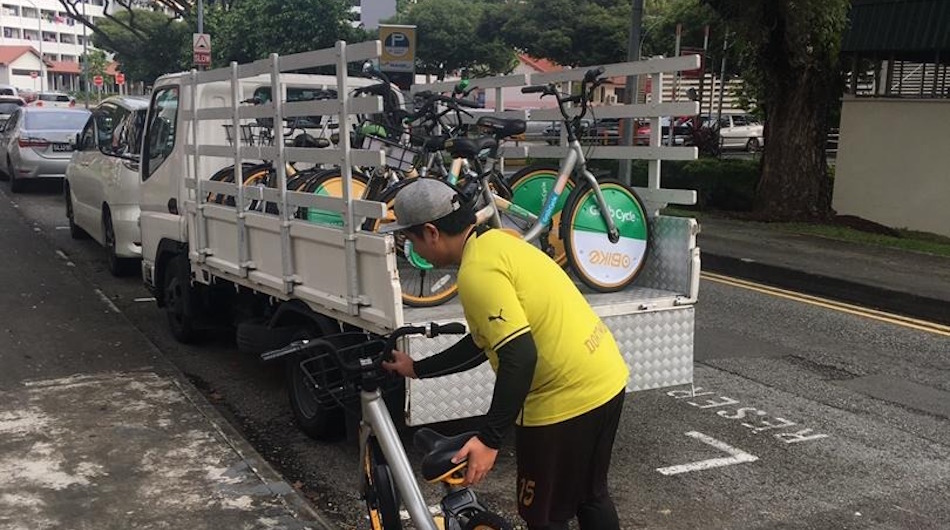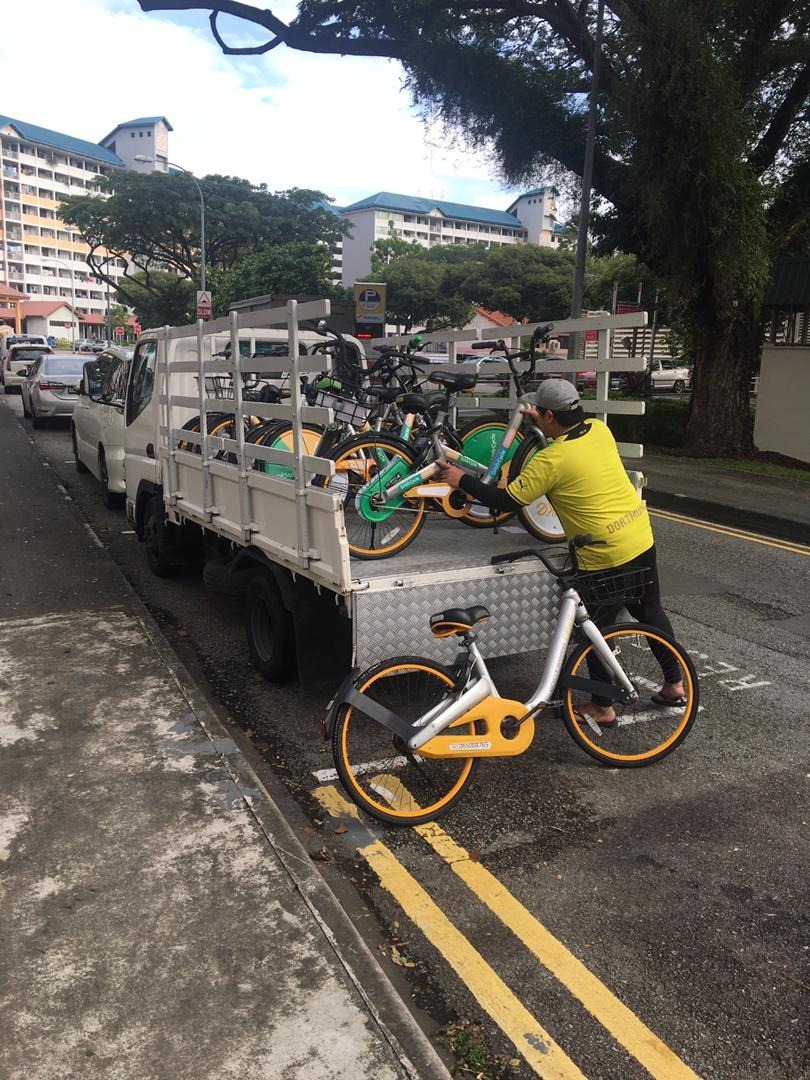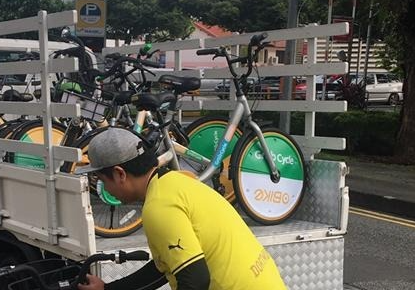The move marked the start of the two firms' partnership.
OBike today announced a strategic partnership with ride-hailing company Grab.
For starters, oBike will integrate GrabPay into its app, offering its riders another cashless payment option and the ability to earn GrabReward points. Grab branding will also appear on its bikes.
These are the first of various joint initiatives that the two firms will launch “to improve the on-demand transport infrastructure in Singapore,” oBike said in a statement today.

The company said it would reveal the specifics of those other initiatives in the coming weeks. It didn’t say if its bike-sharing service would be integrated into Grab’s own app, but that is a possibility.
The announcement comes as no surprise given that Grab is an investor in oBike – a rumor that oBike confirmed to Tech in Asia today, and plans for a tie-up in Singapore surfaced last week.
An eagle-eyed Tech in Asia reader spotted what looked like oBike bicycles decked out with Grab branding being loaded onto the back of a truck along Commonwealth Drive in Singapore’s Queenstown area. We weren’t able to independently confirm it then, and both Grab and oBike declined to comment at the time.

The wheel cover panels clearly display a “GrabCycle” logo alongside that of oBike, while the bike frame also appears to carry both logos.

What’s in it for Grab and oBike The ride-hailing industry has seen a trend of players adding bikes to their apps. China’s Didi Chuxing did it initially through a tie-up with Ofo then later Bluegogo, and now it’s about to launch its own. India’s Ola has unveiled a bike service as well.
While neither party confirmed it, it appears that Grab might be adding oBike to its own app. “We are always exploring new mobility options that cater to consumers with different traveling preferences and price points. Bicycle-sharing complements Grab’s current transport service offerings as a viable first- and last-mile option for commuters,” said a Grab spokesperson.
Jochen Krauss, managing partner at consultancy Simon-Kucher & Partners, thinks an integration makes sense. “The overall goal is to provide a holistic solution set for mobility services. Grab wants to provide their customers the most efficient way to go from point A to B at any point of time and that could be a taxi, a motorcycle, a bike,” he said.
For Grab, partnering gives it access to an existing network. “If you’re Grab, do you really want to be the number 4 or number 5 player in bike-sharing? There are existing players that have infrastructure in the market so [partnering] is an easy way to get market share,” Krauss argued.
Financially, Krauss said Grab gains an additional revenue stream from oBike rides that users purchase using GrabPay. Integrating oBike in the Grab app would also entail some form of revenue-sharing. An oBike spokesperson declined to confirm plans to completely integrate but said there would be revenue-sharing if it happens.
For its part, oBike would gain exposure to millions of Grab users in Southeast Asia – Grab handles more than 3.5 million transactions per day and a billion a year. It can also tap into Grab’s existing network of partner-drivers for its newly launched delivery service.
However, is there a risk that the duo might be taking business away from each other in the delivery segment? According to Krauss, this is possible “in theory,” but in practice, he believes that “their market share is still small that it doesn’t matter.”
Ultimately, Krauss said a longer-term plan would eliminate any cannibalization issue. “Now the question is, will it be a pure cooperation or will it be something else that we simply don’t see yet? Is there a play to bring those two companies closer together?” he pointed out, hinting at a possible acquisition deal down the road.
In the meantime, he noted that both firms can expect to gain deep insights into usage patterns by joining forces. Those insights would help them make their operations more efficient. “There’s a lot of information that can fly into their algorithms. From the supply side, now they’d know where people are going, where they’re being picked up, where the shortages are. They can strategically allocate more bikes or cars in those areas.”
Why oBike and not its larger rivals Singapore-based oBike is competing with far larger Chinese rivals ofo and Mobike in the city-state and other markets like Malaysia and Thailand.
Didi-backed ofo would’ve been the more obvious partner for Grab, since they both count the Chinese ride-hailing titan as an investor. However, reports have suggested that the Didi-ofo tandem hasn’t been working out.
The Information reported that the relationship began to crumble when Didi and some other ofo investors tried to arrange a merger between ofo and Mobike. With ofo’s co-founders still holing majority voting rights, that merger idea failed after both startups strongly opposed it.
For its part, Mobike seems to be dead set on gaining a huge foothold in the transport sector. After rolling out its own ride-hailing service in China late last year, it could do the same in markets where it has presence, including Southeast Asia. That will pit it against Grab and other ride-hailing apps in the region.
Ofo is backed by Alibaba while Mobike is backed by Alibaba rival Tencent, representing another proxy war between the two Chinese tech giants.
Joining forces with Grab makes sense for ofo, which is lagging behind its competitors. Grab is a leading ride-hailing app in Southeast Asia, and oBike may want to focus on the region if it wants to carve out a niche, Jackie Lam, co-founder of startup research firm Oddup, earlier told Tech in Asia.
One challenge for bike-sharing companies operating in the region is attracting a critical mass of users, said Krauss of Simon-Kucher & Partners. This is something that Grab might also be looking into.
“Singapore and most parts of the region are not bicycle towns. I believe there’s a need for a bigger push by governments in order to make bikes more suited to the cities. There are many problems, such as missing bike lanes, not to mention it’s still very dangerous,” he explained.
Update (Jan. 22, 8:00 pm): Added analysis and comments from Grab and oBike.


 Advertise
Advertise




















Commentary
AI is revolutionising learning: Why should educational institutions in Singapore embrace this change?
Seeking an office space in Singapore: Where do you start?